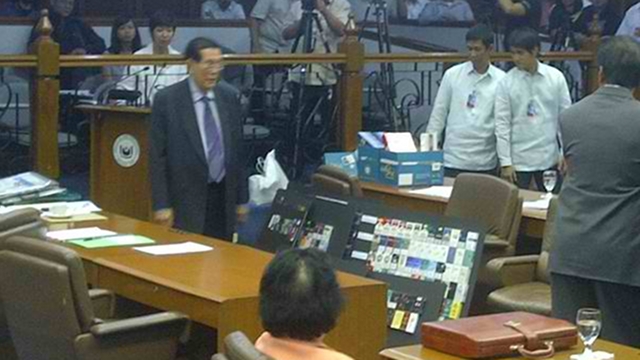SUMMARY
This is AI generated summarization, which may have errors. For context, always refer to the full article.

MANILA, Philippines – Only the signature of President Benigno Aquino III is needed to make the historic sin tax reform bill a law.
In a close vote of 10-9, the Senate ratified the bicameral conference committee report on the bill on Tuesday, December 11. The House also ratified its version Tuesday in a voice vote.
This is one of the last hurdles in ending the 15-year wait to reform the excise tax structure for “sin” products: alcohol and cigarettes.
The bill will make the two products less affordable, as well as raise an additional P33.96 billion revenues in 2013, or the first year of implementation. The additional revenues will be spent on universal health programs and tobacco farmers’ livelihood. (See the tax rate breakdown here.)
Sen Franklin Drilon, sponsor of the Senate version, said the measure will be sent within the week to Aquino who is expected to sign it into law before Christmas.
Voting
The 9 senators who voted against the bill were:
- Sen Jinggoy Estrada
- Sen Ferdinand Marcos Jr
- Sen Ralph Recto
- Sen Francis Escudero
- Sen Juan Ponce Enrile
- Sen Joker Arroyo
- Sen Vicente Sotto III
- Sen Ramon Revilla Jr
- Sen Gregorio Honasan II
Those who voted in favor of the bill were:
- Sen Edgardo Angara
- Sen Franklin Drilon
- Sen Panfilo Lacson
- Sen Pia Cayetano
- Sen Miriam Defensor Santiago
- Sen Sergio Osmeña III
- Sen Lito Lapid
- Sen Aquilino Pimentel III
- Sen Antonio Trillanes IV
- Sen Francis Pangilinan
Before the passage of the bill, senators took hours to interpellate Drilon on the bicam report. Senators Joker Arroyo, Juan Ponce Enrile, Edgardo Angara and Ferdinand Marcos Jr expressed concern about the earmarking of the bill, and possible negative effects on tobacco farmers and increase in smuggling.
The bill though was passed with strong opposition from critics.
Sen Ralph Recto did not sign the bicam report and dissented in its ratification. Recto said he is against the lump sum earmarking for the Philippine Health Insurance Corp (Philhealth).
Recto proposed in the Senate version that P23 billion of revenues from alcoholic and tobacco products be earmarked to Philhealth, breaking down the amount by district hospitals and regional hospitals.
In an interview with reporters, Recto said the provision will politicize the allocation of funds.
“Ang pera parang blank check na binigay mo sa DOH. Ang mga pulitiko ngayon lalapit sa kanila. Sila ngayon ang Diyos na magsasabi sinong bibigyan sinong hindi o mas mahalaga ba na ilagay natin sa batas yun,” Recto said. (The money will be like a blank check you give to the DOH. The politicians will now approach them. They will act like God that will say who they will give money to. Isn’t it more important that we specify the earmarking in the law?)
Marcos made a manifestation on his objection. “All this [bill] will do is destroy the tobacco industry, large parts of the alcohol industry without collecting the target revenues, and [it will] increase smuggling, while failing to decrease cigarette consumption.”
Sen Joker Arroyo also dissented, questioning the lump sum as “the bane of the budgeting process.”

‘Moving excise system forward’
The ratification followed the bicam’s signing ceremony in the Senate Tuesday morning, with Drilon and his House counterpart, Davao City Rep Isidro Ungab, leading the event.
Finance Secretary Cesar Purisima, Bureau of Internal Revenue Commissioner Kim Henares, and Finance Undersecretary Jeremias Paul witnessed the signing. Also present were bicam members Sen Pia Cayetano, Batanes Rep Henedina Abad, and Negros Oriental Rep Jocelyn Limkaichong.
“I am glad we are able to put to bed this reform measure, a reform measure which everybody was waiting for, for the past 16 years,” Drilon said after the signing.
“We have achieved something that we really need in order to move our excise system forward and I’m glad I have the support of the chamber,” added Drilon who is also the acting chairperson of the Senate Ways and Means Committee.
The sin tax bill includes two tiers for tobacco and fermented liquor, and a combination of ad valorem and specific tax for distilled spirits. An ad valorem tax is based on the price or value of the product while a specific tax is fixed regardless of price.
The enactment of the sin tax reform bill marks the first time in 15 years that a sin tax bill made it out of committee meetings and was voted on. The effect of the bill would be to end the price and brand classification freeze on alcohol and tobacco products for years.
The Senate passed the bill in November while the House approved it in June.
Touted as a health and revenue measure, the bill is a priority of the Aquino administration. Aquino certified it urgent to ensure its speedy passage.
The passage of the law was a struggle for sin tax advocates, with some lawmakers vehemently opposing the bill. In the Senate, Enrile, Recto and Marcos were against high taxes on tobacco, saying government figures not realistic, and may displace tobacco farmers.
‘Happy for structural reforms’
In the press conference after the signing, Drilon emphasized the health benefits Filipino families will reap from the bill.
He said that in 2013, an additional 5.2 million families will be enrolled in government’s Universal Health Care Program under the Philhealth. In 2014, the beneficiaries to be funded by sin taxes will increase to 10.4 million families.
This is on top of the 5.2 million poorest Filipino families currently enrolled in Philhealth, with funds coming from the Department of Health’s budget.
Henares told reporters that while the P33.96 billion revenues in the first year is way lower than the government’s initial target of P60 billion, she is glad the bill will finally become law.
“When we came in, as far as the BIR and DOF are concerned, there are major reforms we want to institute, first the removal of the annexes, the removal of the price freeze and the indexation. We got all 3 so for us, because those are the structural reform that we were really pushing for, we’re happy in that sense.”
Henares said that the P60 billion target went down to P31.5 billion in the House version, then increased to P39.5 billion in the Senate version, then down again to P33.96 billion in the final one.
“But that is part of the legislative process. You cannot get everything that you go in for but for us, the most important [is the] reform that we have,” Henares told reporters.
‘Correcting inequities in tax structure’
In a separate statement, Purisima echoed Henares, saying the passage of the bill was a historic victory for health and revenue reform.
“The measure achieves all essential reforms by correcting inequities in tax structure that have plagued the system for decades. These inequities have made sin products cheaper than they should be, to the detriment of public health objectives.”
Purisima detailed the following improvements in the sin tax bill:
- The version that was passed removes the price classification freeze that has pegged tobacco products to 1996 prices as the basis for their tax classification
- This version removes annexes that have unfairly favored brands introduced at an earlier date;
- This version provides for a unitary tax regime by 2017 for tobacco and fermented liquor, a shift from the current multi-tiered system that has allowed smokers to downshift to lower-priced products.
- This version indexes the tax rates of tobacco and alcohol by 4% every year so that these products do not become more affordable over time, consequently exposing the poor and the young to the harmful effects of smoking and excessive drinking
Still, tobacco farmers and urban poor groups continued protesting the bill. On the day of the bill’s ratification, the protesters again staged a demonstration outside the Senate compound.
They have been protesting for several weeks now, saying the sin tax bill will harm the livelihood of tobacco farmers, workers and cigarette vendors.
Here is the bicameral conference committee report on the sin tax bill :
– Rappler.com
Add a comment
How does this make you feel?
There are no comments yet. Add your comment to start the conversation.